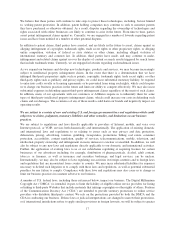Yahoo 2010 Annual Report Download - page 23
Download and view the complete annual report
Please find page 23 of the 2010 Yahoo annual report below. You can navigate through the pages in the report by either clicking on the pages listed below, or by using the keyword search tool below to find specific information within the annual report.In addition, widespread adoption of new Internet, networking or telecommunications technologies, or other
technological changes could require substantial expenditures to modify or adapt our services or infrastructure.
The technology architectures and platforms utilized for our services are highly complex and may not provide
satisfactory support in the future, as usage increases and products and services expand, change, and become more
complex. In the future, we may make additional changes to our, or move to completely new, architectures,
platforms and systems. Such changes may be technologically challenging to develop and implement, may take
time to test and deploy, may cause us to incur substantial costs or data loss, and may cause delays or interruptions
in service. These changes, delays, or interruptions in our service may cause our users, Affiliates and other
advertising platform participants to become dissatisfied with our service and move to competing providers or
seek remedial actions or compensation.
Further, to the extent that demands for our services increase, we will need to expand our infrastructure, including
the capacity of our hardware servers and the sophistication of our software. This expansion is likely to be
expensive and complex and require additional technical expertise. As we acquire users who rely upon us for a
wide variety of services, it becomes more technologically complex and costly to retrieve, store, and integrate data
that will enable us to track each user’s preferences. Any difficulties experienced in adapting our architectures,
platforms and infrastructure to accommodate increased traffic, to store user data, and track user preferences,
together with the associated costs and potential loss of traffic, could harm our operating results, cash flows from
operations, and financial condition.
We have dedicated considerable resources to provide a variety of premium services, which might not prove to
be successful in generating significant revenue for us.
We offer fee-based enhancements for many of our free services, including e-mail, personals, and finance. The
development cycles for these technologies are long and generally require significant investment by us. We have
invested and will continue to invest in new products and services. Some of these new products and services might
not generate anticipated revenue or might not meet anticipated user adoption rates. We have previously
discontinued some non-profitable premium services and may discontinue others. We must, however, continue to
provide new services that are compelling to our users while continuing to develop an effective method for
generating revenue for such services. General economic conditions as well as the rapidly evolving competitive
landscape may affect users’ willingness to pay for such services. If we cannot generate revenue from these
services that are greater than the cost of providing such services, our operating results could be harmed.
If we are unable to recruit and retain key personnel, we may not be able to execute our business plan.
Our business is dependent on our ability to recruit, hire, motivate, and retain talented, highly skilled personnel.
Achieving this objective may be difficult due to many factors, including the intense competition for such highly
skilled personnel in the San Francisco Bay Area and other metropolitan areas where our offices and the offices of
several of our vertical and horizontal competitors are located, as well as fluctuations in global economic and
industry conditions, changes in our management or leadership, competitors’ hiring practices, and the
effectiveness of our compensation programs. If we do not succeed in recruiting, retaining, and motivating our
key employees and in attracting new key personnel, we may be unable to meet our business plan and as a result,
our revenue and profitability may decline.
We rely on third-party providers of rich media formats to provide the technologies necessary to deliver rich
media content and advertising to our users, and any change in the licensing terms, costs, availability, or user
acceptance of these formats and technologies could adversely affect our business.
We rely on leading providers of media formats and media player technology to deliver rich media content and
advertising to our users. There can be no assurance that these providers will continue to license their formats and
player technologies to us on reasonable terms, or at all. Providers of rich media formats and player technologies
may begin charging users or otherwise change their business model in a manner that slows the widespread
21
























